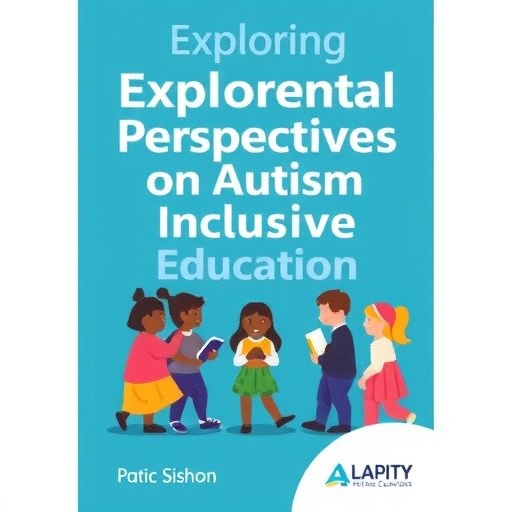Parents’ Awareness, Attitudes, and Acceptance of Inclusive Education for Children with Autism: A Path Analysis
In an ever-evolving landscape of educational practices, one topic that frequently emerges is the notion of inclusive education, which integrates children with special needs into mainstream classrooms. Recent research has delved into examining the perceptions of parents regarding inclusive education, particularly for children diagnosed with autism. The study conducted by Lei, P., Liu, S., and Liu, D. provides critical insights into the awareness, attitudes, and levels of acceptance among parents towards this educational approach during a time when early childhood education is adapting to more inclusive models.
In this path analysis, the researchers highlight how various factors influence parents’ acceptance of inclusive education. The study emphasizes that parents’ beliefs and attitudes are often shaped by their personal experiences, cultural contexts, and the level of information they possess concerning autism and inclusion. By evaluating these factors systematically, the researchers aim to illuminate the pathways through which parental awareness translates into active support for inclusive practices in schools.
One of the primary themes identified in the research is the significant role that awareness plays in shaping parents’ attitudes. Parents who have a higher awareness of the benefits of inclusive education are more likely to foster positive attitudes towards teaching environments where children with autism can learn alongside their neurotypical peers. This awareness comes not only from personal observations or the experiences of their children but also through informational resources provided by educational institutions and support networks.
Importantly, the study underscores the impact that knowledge dissemination has on inclusivity. Many parents initially hold misconceptions about autism and the capabilities of children with autism in a classroom setting. As the researchers point out, targeted informational campaigns can effectively alter these misconceptions, promoting a more favorable reception of inclusive education. Educational stakeholders must recognize their essential role in providing accurate information and creating supportive environments conducive to inclusivity.
Moreover, the study reinforces the idea that a supportive community fundamentally influences parents’ acceptance of inclusive education. Parents are often curious about how other families cope with challenges associated with inclusion. They tend to gravitate towards communities where they can share experiences, seek advice, and learn from the journeys of others. When parents feel that they are part of a broader network that values inclusive practices, their acceptance and support of such systems are amplified.
Additionally, the researchers conducted interviews and surveys to evaluate how socio-economic factors correlate with parental attitudes towards inclusion. This analysis revealed that socio-economic status plays a critical role in determining the level of awareness that parents possess regarding special education policies and practices. Families with higher economic means often have greater access to information, resources, and professional support that can help bridge the gap between their children’s needs and what educational institutions provide.
A noteworthy finding from the study is the emotional landscape navigated by parents of children with autism. Their feelings, ranging from fear and anxiety to hope and empowerment, greatly influence their perspectives on inclusion. This emotional aspect can propel or hinder their acceptance of inclusive strategies utilized in educational settings. Educational frameworks must be sensitive to these emotional dynamics, ensuring that parents feel supported throughout their children’s educational journey.
The notion of parental involvement in decision-making processes regarding education for their children with autism was another significant area of focus in the research. Involving parents in discussions about inclusive practices can enhance their acceptance, as they feel their insights and experiences are valued in shaping educational policies. The collaborative approach not only benefits parents but also enriches the educational environment for all children, fostering an atmosphere of inclusivity.
In recent years, many educators have taken a proactive stance in inviting parents into the conversation about inclusivity. Strategies such as workshops, seminar discussions, and collaborative planning sessions have proven to be effective methods in bridging the gap between educational frameworks and parental concerns. This shared commitment is vital in de-stigmatizing autism and cultivating a culture that embraces diversity within educational settings.
As the study illustrates the complex webs formed by awareness, attitudes, and acceptance, it challenges stakeholders to reconsider their approaches to inclusive education. Teachers, administrators, and policymakers must work in concert to create systems that not only accommodate the educational needs of children with autism but also ensure that their families feel involved and validated in the journey. The pathway toward acceptance is gradual, necessitating comprehensive strategies that incorporate emotional, social, and informational support.
The findings from Lei, P., Liu, S., and Liu, D. contribute to a growing body of literature advocating for inclusive education while shining a spotlight on the crucial role that parents play. As advocates for their children, parental voices should resonate within the framework of educational reform. Their insights can significantly shape educational practices, ultimately benefiting not just children with special needs, but the entire student population.
In conclusion, the research by Lei and colleagues serves as a clarion call for educational systems to prioritize inclusivity, ensuring that every child, regardless of their challenges, has the opportunity to thrive. By fostering an environment of awareness, collaboration, and support among parents, educators can drive meaningful change in how inclusive education is perceived and practiced. The journey toward acceptance is ongoing, but with the right resources and a united community, the vision of a truly inclusive education can become a reality.
Subject of Research: Parents’ Awareness, Attitudes, and Acceptance of Inclusive Education for Children with Autism
Article Title: Parents’ Awareness, Attitudes and Acceptance of Inclusive Education for Children with Autism: A Path Analysis
Article References:
Lei, P., Liu, S., Liu, D. et al. Parents’ Awareness, Attitudes and Acceptance of Inclusive Education for Children with Autism: A Path Analysis.
Early Childhood Educ J (2025). https://doi.org/10.1007/s10643-025-01934-7
Image Credits: AI Generated
DOI:
Keywords: Inclusive Education, Autism, Parental Attitudes, Awareness, Special Needs Education, Early Childhood Education




